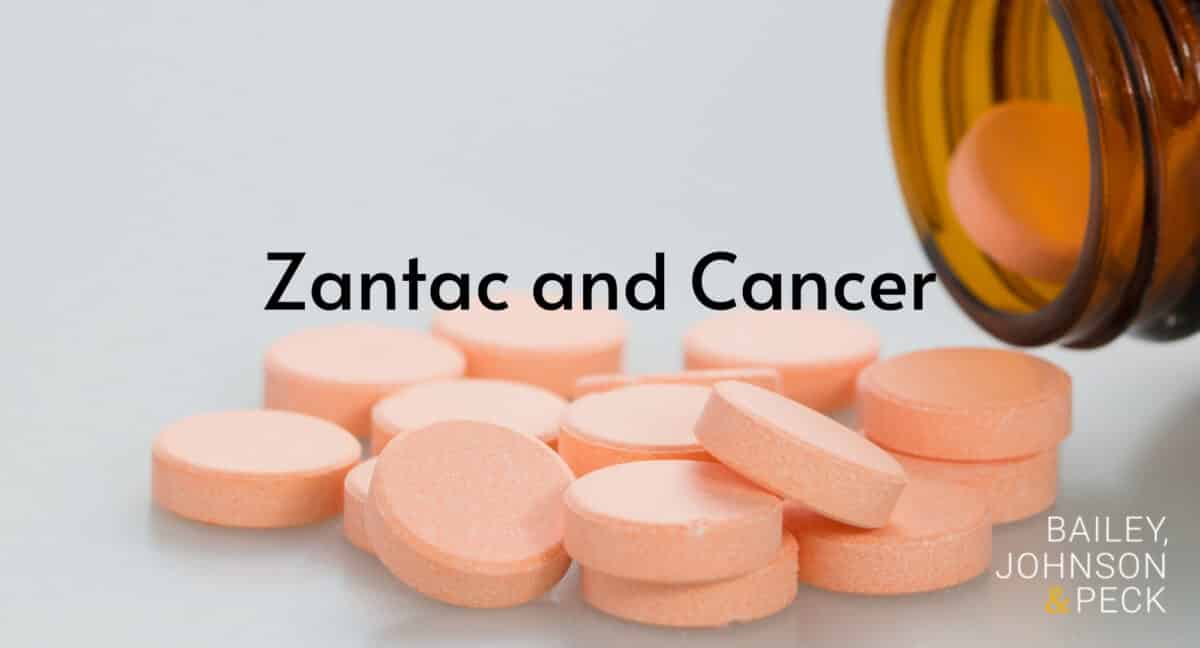Have you taken the common heartburn drug Zantac and later received a cancer diagnosis? Recent research, lawsuits, and drug recalls from several pharmaceutical companies suggest that Zantac can increase cancer risk or even cause cancer. Developing cancer is heartbreaking and terrifying for not only the patient, but for the loved ones too. Even if a patient survives cancer, they will still have to live with the physical, mental, and financial consequences of their intensive treatment. That’s why the legal team at Bailey, Johnson & Peck takes Zantac and cancer cases so seriously. Our Albany personal injury lawyers fight aggressively for all victims of drug injuries, product liability issues, medical malpractice, and defective medical devices. We want to do the same for you. Call us today at 518-456-0082 for a free consultation.
What is Zantac?
Zantac, also called ranitidine, is a common heartburn medication. It is also one of many histamine 2 (H2) blockers. H2 blockers basically reduce the production of stomach acid.
What Health Conditions Does Zantac Treat?
Zantac can treat heartburn, indigestion, mild acid reflux, gastroesophageal reflux disease (GERD), peptic ulcer disease, and Zollinger-Ellison syndrome.
Why Was Zantac Recalled?
In April 2020, the Food and Drug Administration (FDA) recalled Zantac in the United States because it may contain high levels of N-Nitrosodimethylamine (NDMA), which has been called a “probable human carcinogen.” In other words, NDMA is a harmful chemical that can cause an increased risk of cancer.
It’s important to note that drug manufacturers didn’t purposely put NDMA in ranitidine drugs. Instead, generic Zantac products can develop high levels of NDMA over time when stored at room temperature. Many researchers believe that gradual NDMA development in Zantac products is an unintentional byproduct of the drug manufacturing process.
Drug Makers That Have Recalled Zantac
Multiple drug companies began recalling Zantac before the FDA did, including the ones listed below.
- Sanofi recalled Zantac 150, 150 Cool Mint, and Zantac 75 in October 2019.
- Sandoz recalled 150mg and 300mg of ranitidine medications in September 2019. These doses come in 20, 60, and 500 count bottles.
- Apotex recalled 75mg and 150mg tablets of ranitidine in September 2019.
- Perrigo Company PLC recalled all their ranitidine heartburn medications on an international basis in October 2019. The company also stopped all outgoing shipments of ranitidine products around the time of its recall.
- Dr. Reddy’s Laboratories Ltd. recalled its Zantac drugs in October 2019. This company’s ranitidine products are frequently sold at major retailers such as Target, Walgreens, Walmart, Sam’s Club, and CVS.
- Novitum Pharma LLC recalled all its ranitidine drugs in October 2019.
- Aurobindo Pharma USA recalled 150mg tablets of Zantac, 300mg capsules of Zantac, and 15mg of ranitidine syrup in November 2019.
- American Health Packaging (AHP) recalled its 150mg ranitidine syrup in November 2019. In February 2020, AHP also recalled 11 lots of Zantac tablets.
- Golden State Medical Supply Inc. recalled 7 lots of 150mg ranitidine HCL capsules and 12 lots of 300mg ranitidine HCL capsules in November 2019.
- Precision Dose Inc. recalled 5 lots of its 150mg ranitidine oral solution.
- Amneal Pharmaceuticals LLC recalled 150mg and 300mg ranitidine tablets along with its 15mg ranitidine syrup in November 2019.
- Glenmark Pharmaceuticals Inc. recalled 928 lots of 150mg and 300mg ranitidine tablets in December 2019.
- Denton Pharma dba Northwind Pharmaceuticals recalled its 150mg and 300mg ranitidine tablets in January 2020.
- Appco Pharma LLC recalled 8 lots of 150mg and 300mg ranitidine capsules in January 2020.
How Dangerous is NDMA?
Trace amounts of NDMA are generally not harmful. In fact, some foods and even water have low levels of NDMA. But high levels of NDMA are certainly dangerous. Researchers speculate that some ranitidine products contain NDMA levels that are several thousand times higher than what’s safe for human consumption.
In fact, a 2021 JAMA study claims that the Zantac Cool Mint product (ranitidine 150) had a baseline of 19 nanograms (ng) of NDMA. After storing this product at 70 degrees Celsius for two weeks, it had 70ng of NDMA, which is just below the FDA’s maximum acceptable level. So imagine how much NDMA your bottle of Zantac has, especially if it’s been sitting in your medicine cabinet for years.
Does Zantac Cause Cancer?
Right now, research about the ranitidine cancer risk is ongoing. Medical professionals can’t say without a shadow of a doubt that generic ranitidine drugs contaminated with NDMA, such as Zantac, will cause cancer.
However, the Food and Drug Administration (FDA) has called NDMA a probable carcinogen. This means that there have been a few studies showing that NDMA can cause cancer in animals. Further research is needed to prove the link between cancer and ranitidine drugs in humans, though.

What Kind of Cancer Does Zantac Cause?
Studies involving animals and humans link Zantac and NDMA contamination to the following cancers:
- Liver cancer
- Breast cancer
- Esophageal cancer
- Bladder cancer
- Stomach cancer
- Colorectal cancer
- Prostate cancer
- Gastric cancer
- Colon cancer
- Kidney cancer
As previously stated, much more research is needed on the relationship between prescription Zantac and the aforementioned cancers. However, if you have a lengthy history of taking Zantac and you’ve recently been diagnosed with cancer, you should contact an Albany cancer misdiagnosis attorney or defective drug attorney at Bailey, Johnson & Peck today. You may be eligible for significant financial compensation from a Zantac lawsuit.
Zantac Cancer Symptoms
If you’ve been diagnosed with cancer after months or years of taking ranitidine, you may experience the following symptoms.
- Stomach swelling or bloating after eating small amounts of food
- Loss of appetite or change in appetite
- Changes in stool shape, size, or color
- Bloody stools
- Bloody urine
- Consistent abdominal pain and cramping
- Anemia
- Chest pain, coughing, shortness of breath
- Long-term fever and chills that are not caused by the flu, a cold, or any other virus
- Constant weakness and fatigue
- Nausea
- Vomiting
- Vomiting blood
- Frequent, severe heartburn and indigestion
- Night sweats
- Leg or ankle swelling
- Difficulty swallowing
- Swollen, possibly painful lymph nodes in the armpits, neck, or groin
- Unexplained weight loss
- Jaundice
These symptoms can be associated with a variety of different cancers, such as liver cancer, stomach cancer, colon cancer, etc. If you experience these symptoms but haven’t received an official diagnosis, visit the doctor as soon as possible.
What To Do if You Frequently Take Zantac
If you have a long history of taking Zantac for acid reflux or any other stomach acid-related issues, you should stop taking it and search for an alternative. Make sure to throw the medication away so that you or your family doesn’t have access to it. You can throw it away safely by following the disposal instructions on the package.
Zantac Alternatives
If you frequently struggle with heartburn or GERD, you should ask your doctor for a Zantac alternative. The FDA recommends the following alternatives:
- Prevacid (lansoprazole)
- Nexium (esomeprazole)
- Pepcid (famotidine)
- Tagamet (cimetidine)
- Prilosec (omeprazole)
Natural Alternatives
If you struggle with heartburn or stomach acid issues, you could experience relief from natural alternatives and lifestyle changes such as the ones listed below.
- Switch to a low-fat diet.
- Don’t go to bed right after eating a large meal.
- Eat smaller portions. For example, if you eat 3 large meals a day, break it up into 4-6 small meals throughout the day.
- Eat slowly and mindfully.
- Move your body a little bit every day through walking or stretching.
- Don’t eat right before working out. Wait a couple of hours, then work out.
- Maintain a healthy weight.
- Avoid fatty meals, excessive caffeine, raw onions, and alcohol. These foods and drinks can trigger acid reflux.
- Avoid smoking because it can gradually weaken the esophageal sphincter.
How Many Zantac Lawsuits Have Been Filed?
Americans have filed approximately 2,000 Zantac cancer lawsuits as of May 2022. But thousands more have filed Zantac cancer claims. In MDL-2924, a Zantac lawsuit attorney is pursuing the connection between the drug and these five types of cancer:
- Bladder cancer
- Liver cancer
- Pancreatic cancer
- Stomach cancer
- Esophageal cancer
If you believe that you developed cancer after long-term use of Zantac, the legal team at Bailey, Johnson & Peck wants to help you file a Zantac lawsuit.
Types of Damages for Zantac and Cancer
If the evidence in your lawsuit strongly suggests that NDMA exposure through Zantac caused your cancer, you could win many types of damages such as:
- Past and future medical bills
- Past and future rehabilitative bills
- Physical pain and suffering
- Loss of enjoyment of daily life
- Emotional anguish
- Lost wages
- Loss of earning capacity
- Loss of consortium
- Funeral and burial expenses if cancer caused death

Call Bailey, Johnson & Peck Today
If you’ve recently received a cancer diagnosis after years of taking Zantac, you may be eligible for financial compensation. A Zantac cancer attorney at Bailey, Johnson & Peck will diligently listen to your story, gather evidence on your behalf, consult with a medical expert regarding your case, and handle all the legal jargon while you focus on your health. Our legal team has extensive experience in handling all sorts of medical malpractice cases, drug injury cases, defective medical device cases, and more. We are the strong legal representation you need to get the compensation you deserve. Call 518-456-0082 to file a Zantac cancer lawsuit today.




